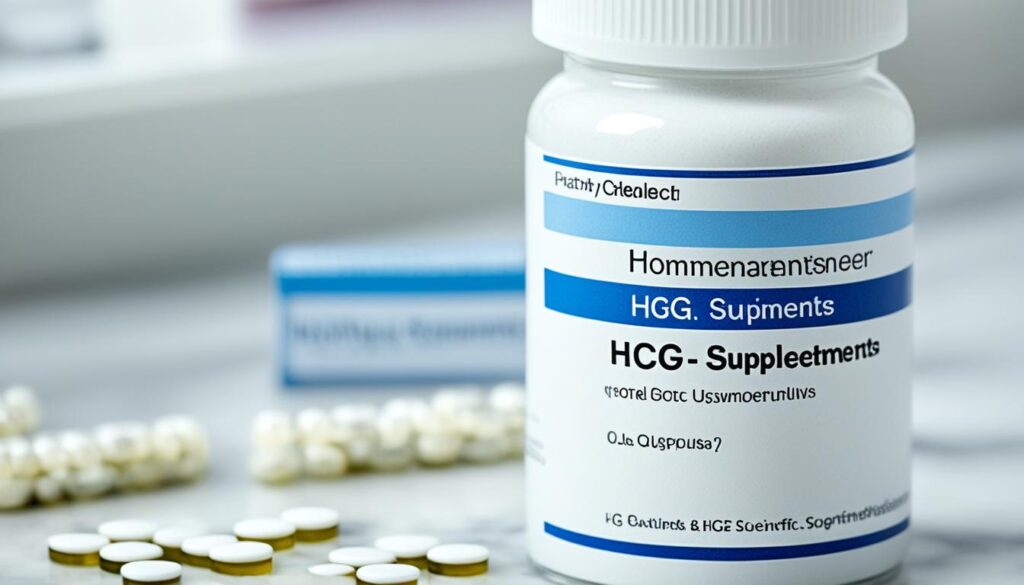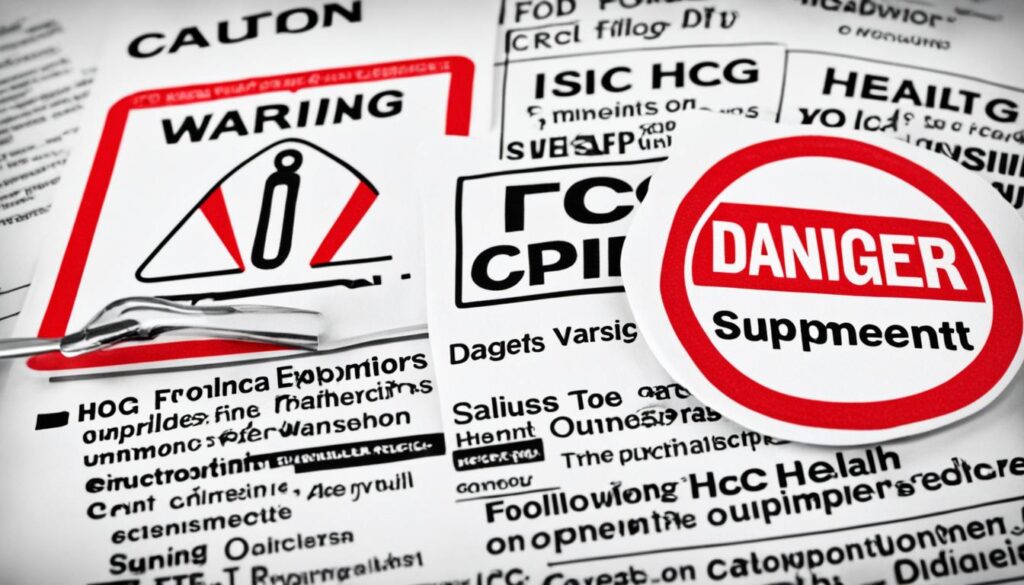Did you know that over-the-counter HCG weight-loss products, which are often marketed as a quick and easy solution for shedding pounds, can actually have dangerous side effects? The FDA has declared the HCG diet unsafe and ineffective, warning against the use of these products. With potential risks such as fatigue, irritability, fluid buildup, and an increased risk of blood clots, it’s crucial to consider safer alternatives for weight loss.
Key Takeaways
- Over-the-counter HCG weight-loss products have been deemed unsafe and ineffective by the FDA.
- The HCG diet is associated with side effects such as fatigue, irritability, and fluid buildup.
- There is no scientific evidence to support the effectiveness of the HCG hormone for weight loss.
- Extreme calorie restriction, not the HCG hormone, is responsible for weight loss on the HCG diet.
- It is important to consult with a healthcare professional and consider safer alternatives for weight loss.
The Safety Concerns of HCG Diet
When it comes to the HCG diet, the Food and Drug Administration (FDA) has raised serious safety concerns. HCG weight-loss products, often marketed as a way to achieve rapid weight loss, have been associated with various side effects that can have detrimental effects on overall health. It’s essential to understand the potential risks involved before considering this diet plan.
The FDA’s Warning
The FDA strongly advises against the use of HCG diet products due to safety concerns. These products are not approved by the FDA and are often sold over-the-counter without prescription. The FDA warns that HCG does not contribute to weight loss, and any weight loss experienced on the HCG diet is primarily a result of severe calorie restriction rather than the hormone itself.
“FDA is advising consumers who are currently on an HCG diet to stop using the product, to stop following any labeled dieting instructions, and to discard the product.”
Potential Side Effects
Using HCG weight-loss products can lead to a range of side effects that can impact well-being. These include:
- Gallstone formation: HCG diet can increase the risk of developing gallstones, which can cause severe pain and discomfort.
- Electrolyte imbalances: The extreme calorie restriction involved in the HCG diet can lead to imbalances in essential electrolytes, such as potassium and sodium, affecting various bodily functions.
- Irregular heartbeat: Some individuals have reported experiencing irregular heart rhythms while following the HCG diet, which can be dangerous and require medical attention.
It is crucial to be aware of these potential side effects and consider safer alternatives for weight loss.
The Effectiveness of HCG Diet

Despite claims of effectiveness, there is no scientific evidence to support the use of HCG for weight loss. Multiple studies have found that weight loss achieved on the HCG diet is solely due to extreme calorie restriction, not the HCG hormone itself. The diet typically limits calorie intake to 500 per day, which can lead to short-term weight loss, but does not promote sustainable or long-term results.
The Role of Calorie Restriction
HCG diet proponents argue that the hormone enhances weight loss by suppressing appetite and targeting stubborn fat stores. However, research has shown that the limited calorie intake, rather than the presence of HCG, is responsible for the weight loss observed. Severely restricting calories causes the body to rely on stored fat for energy, leading to initial weight loss.
“Weight loss achieved on the HCG diet is primarily a result of calorie restriction, not the HCG hormone itself.”
Lack of Scientific Evidence
Scientific studies have consistently failed to establish a causal relationship between HCG and weight loss. A review conducted by the Journal of Dietary Supplements concluded that there is “no scientific evidence to substantiate claims that HCG is effective in the treatment of obesity.” Additionally, the American Society of Bariatric Physicians released a statement stating that “there is no scientific evidence that HCG is effective in the treatment of obesity.”
The Short-Term Nature of HCG Diet Results
While some individuals may experience significant weight loss during the HCG diet, it is important to note that these results are typically short-lived. The severe calorie restriction is not sustainable for long periods and can lead to muscle loss, nutritional deficiencies, and metabolic slowdown. Once normal eating habits are resumed, weight regain is common.
| Pros | Cons | |
|---|---|---|
| Short-term weight loss | ✓ | ✕ |
| Simplicity | ✓ | ✕ |
| Social restrictions | ✕ | ✓ |
| Long-term sustainability | ✕ | ✓ |
Note: The table above highlights the pros and cons of the HCG diet.
Ineffective and Risky Approach to Weight Loss
In summary, the HCG diet’s effectiveness is primarily attributed to extreme calorie restriction rather than the HCG hormone itself. Moreover, the diet is not sustainable in the long term and can pose risks to overall health due to its severe restrictions. For safe and effective weight loss, it is advisable to explore alternative strategies that prioritize balanced nutrition, regular physical activity, and professional medical guidance.
Risks and Side Effects of HCG Diet
The HCG diet carries significant risks and can lead to various side effects that should be thoroughly considered before embarking on this weight loss program. In addition to the previously mentioned potential for gallstone formation, electrolyte imbalances, and irregular heartbeat, there are several other side effects that can occur.
Common side effects of the HCG diet include:
- Fatigue: Individuals may experience feelings of tiredness and decreased energy levels.
- Irritability: The severe calorie restriction can lead to increased irritability and mood changes.
- Restlessness: Some individuals may experience restlessness or difficulty sleeping.
- Depression: The restrictive nature of the diet may contribute to feelings of sadness or depression.
- Fluid buildup: Edema, or fluid retention, can occur as a result of the diet’s impact on electrolyte balance.
- Swelling of breasts in males: Hormonal imbalances caused by the HCG diet can lead to breast tissue swelling in males.
- Blood clots: There is a risk of blood clots forming and blocking blood vessels, which can be life-threatening.
These side effects can significantly impact an individual’s well-being and quality of life. Therefore, it is crucial to carefully assess the potential risks and discuss them with a healthcare professional before considering the HCG diet.
Considering the potential risks and side effects associated with the HCG diet, it is important to explore alternative weight loss methods that prioritize safety and overall well-being. Always consult with a healthcare professional who can provide personalized guidance and recommend safer approaches to achieving your weight loss goals.
Safer Alternatives for Weight Loss
If weight loss is your goal, it is important to prioritize your health and explore safer and healthier alternatives. Seeking guidance from a healthcare professional can provide personalized recommendations based on your individual needs. Here are some safer weight loss alternatives to consider:
- Follow a Balanced Diet: Focus on consuming a variety of nutritious foods that provide essential nutrients while controlling portion sizes. Include a balance of carbohydrates, proteins, and healthy fats to support overall health and sustainable weight loss.
- Increase Physical Activity: Engage in regular exercise to boost calorie burn, improve cardiovascular health, and build lean muscle mass. Aim for a combination of aerobic exercises, such as brisk walking or cycling, and strength training exercises to enhance metabolism and promote fat loss.
- Set Realistic Goals: Establish achievable weight loss goals that are realistic and sustainable. Gradual weight loss of 1-2 pounds per week is generally considered safe and more likely to lead to long-term success.
- Adopt Sustainable Lifestyle Changes: Emphasize the importance of incorporating healthy habits into your daily routine. This can include mindful eating, adequate sleep, stress management, and staying hydrated, all of which contribute to overall well-being and weight management.
Remember, every individual is unique, and what works for one person may not work for another. Consulting with a healthcare professional can help you develop a personalized plan that caters to your specific needs and goals.
Importance of Medical Supervision

Medical supervision plays a vital role when considering extreme diets like the HCG diet. The HCG diet entails very low-calorie intake, which can have significant health implications. It is crucial not to attempt this diet without proper medical guidance.
Through medical supervision, a healthcare professional can assess your health status and create a customized weight loss plan that is safe and effective for you. They will monitor your progress closely and provide the necessary support and guidance throughout your weight loss journey.
Having medical supervision ensures that any potential risks or complications are identified early on and appropriate steps are taken to mitigate them. It also enables healthcare professionals to address any concerns or questions you may have, offering you peace of mind and confidence in your weight loss efforts.
Benefits of Medical Supervision for Weight Loss
When undergoing weight loss with medical supervision, you can expect several benefits, including:
- Professional assessment: A healthcare professional will evaluate your overall health and consider any pre-existing conditions or medications that may impact your weight loss journey.
- Personalized guidance: Based on your unique needs and goals, a healthcare professional will create a personalized weight loss plan that takes into account your dietary preferences, exercise capabilities, and lifestyle factors.
- Monitoring and adjustments: Medical supervision allows for regular monitoring of your progress, ensuring that you are on track and making the necessary adjustments if any issues arise.
- Safety assurance: With medical supervision, you can have confidence that your weight loss plan is safe and tailored to your specific health needs, minimizing the risk of potential complications.
- Support and motivation: Healthcare professionals provide ongoing support and motivation throughout your weight loss journey, helping you stay focused and committed to your goals.
Remember, seeking medical supervision offers a safer and more reliable approach to weight loss, especially when considering extreme diets like the HCG diet. Consult with a healthcare professional to ensure that your weight loss journey is both successful and sustainable.
Understanding the HCG Hormone
Human chorionic gonadotropin (HCG) is a hormone produced during pregnancy. It plays a vital role in supporting the development of the fetus and maintaining a healthy pregnancy. Additionally, HCG has been utilized as a marker in home pregnancy tests to detect early signs of pregnancy. This hormone is also prescribed by healthcare professionals for the treatment of fertility issues, as it helps stimulate ovulation in women.
However, it is important to note that elevated levels of HCG in the body may not always indicate a healthy pregnancy. In certain circumstances, increased HCG levels can serve as a potential indicator of certain types of cancer, such as testicular, ovarian, or placental tumors. Therefore, it is crucial to consult with a healthcare professional for proper diagnosis and guidance if you experience abnormal HCG levels.
The concept behind the HCG diet is based on the belief that this hormone can aid in weight loss by suppressing appetite and targeting stubborn fat stores. However, scientific evidence does not support the effectiveness of utilizing HCG for weight loss purposes. Multiple studies have shown that any weight loss experienced while following the HCG diet is primarily due to the severely restricted calorie intake, rather than the HCG hormone itself.
It is essential to approach weight loss in a safe and sustainable manner. Instead of relying on the HCG diet, individuals seeking to lose weight should consider alternative strategies such as adopting a balanced diet, increasing physical activity, and making lifestyle changes that can be maintained long-term. Consulting with a healthcare professional is highly recommended to ensure personalized guidance and support throughout the weight loss journey.
The HCG Diet Plan
The HCG diet plan is structured into three distinct phases: the loading phase, the weight loss phase, and the maintenance phase. Each phase serves a specific purpose in the overall diet plan.
The Loading Phase:
The loading phase, also known as the “gorging” phase, typically lasts for two days. During this phase, individuals are encouraged to consume high-fat foods to build up their fat stores. This phase is believed to “reset” the body’s metabolism and prepare it for the subsequent phases of the HCG diet plan.
The Weight Loss Phase:
The weight loss phase is the most challenging and restrictive phase of the HCG diet plan. Lasting for a duration of three to six weeks, this phase involves severe calorie restriction, with individuals consuming only around 500 calories per day. The goal is to create a calorie deficit that forces the body to utilize stored fat for energy.
The Maintenance Phase:
The maintenance phase follows the weight loss phase and is designed to stabilize weight loss and establish long-term dietary habits. Calorie intake increases gradually, but it remains lower than pre-diet levels to prevent rapid weight regain. This phase typically lasts three weeks and allows for a gradual reintroduction of additional food groups.
Throughout the HCG diet plan, specific meal recommendations and food restrictions are provided. The emphasis is on consuming lean proteins, vegetables, and fruits while avoiding high-calorie foods, sugars, and starches. It is important to strictly adhere to the guidelines and follow the recommended portion sizes to achieve optimal results.
Sample HCG Diet Plan Meal:
| Meal | Food | Calories |
|---|---|---|
| Breakfast | Spinach and Mushroom Omelette | 150 |
| Lunch | Grilled Chicken Breast with Steamed Broccoli | 200 |
| Snack | Apple Slices | 50 |
| Dinner | Baked White Fish with Asparagus | 150 |
| Snack | Strawberries | 50 |
| Total | 600 |
It is important to note that the HCG diet plan’s extreme approach to calorie restriction is not recommended for long-term or sustainable weight loss. Consultation with a healthcare professional is advisable before embarking on any drastic dietary changes to ensure both safety and effectiveness.
By following the prescribed HCG diet plan, individuals aim to achieve significant weight loss during the weight loss phase. However, it is crucial to consider the potential risks and seek safer alternatives for sustained weight loss and overall well-being.
Scam Products and Homeopathic Labels

When it comes to HCG products, it’s important to be vigilant and aware of scam products that flood the market. Many of these products are labeled as homeopathic, leading consumers to believe that they contain highly diluted HCG. However, the reality is that these products do not actually contain any real HCG and are considered scams.
Homeopathic labels are used to deceive consumers into thinking that they are purchasing legitimate HCG products. These labels create an illusion of efficacy and safety, but in truth, they are nothing more than clever marketing tactics.
“Homeopathic labels on HCG products are a way for unscrupulous manufacturers to exploit consumers’ trust and make false claims about the effectiveness of their products.”
Genuine HCG products are only available through prescription and administered via injections. These products undergo strict regulation and are backed by scientific research, ensuring their effectiveness and safety.
As a consumer, it is crucial to be cautious and avoid purchasing fraudulent or ineffective products. Always look for FDA-approved HCG products and consult with a healthcare professional before considering any weight loss regimen.
Remember, your health and well-being should be a priority, and falling for scam products can jeopardize your safety and hinder your weight loss journey.
HCG Products Comparison Table
| Product | Labeling | Ingredients | Formulation | Efficacy |
|---|---|---|---|---|
| Scam HCG Product A | Homeopathic | No real HCG | Pill form | Ineffective |
| Scam HCG Product B | Homeopathic | No real HCG | Liquid form | Ineffective |
| Genuine HCG Product C | Prescription-only | Real HCG | Injection | Effective |
Note: The above table is an illustrative comparison between scam HCG products labeled as homeopathic and genuine HCG products available through prescription. It highlights the lack of real HCG in scam products and emphasizes the importance of obtaining genuine HCG products under medical supervision.
By understanding the deceptive nature of homeopathic labels and being discerning consumers, we can protect ourselves from falling victim to scam products and make informed decisions about the products we choose to invest in for our health.
FDA Warning and Adverse Events Reporting

The FDA has issued a warning regarding the use of HCG diet products. These products have not been approved by the FDA and may pose serious health risks. Adverse events and side effects associated with HCG products should be reported to the FDA for further investigation.
As a regulatory agency, the FDA plays a crucial role in ensuring the safety and efficacy of medical products. The warning against HCG diet products reinforces the need for consumers to be cautious when considering these products for weight loss.
If you have experienced any adverse events or side effects from using HCG products, it is important to report them to the FDA. Adverse event reporting is a vital tool in monitoring the safety of medical products and can help identify potential risks and trends.
Reporting adverse events can be done through the FDA’s MedWatch program, which allows individuals to voluntarily report problems with medical products. By reporting adverse events, you contribute to a safer marketplace and help protect the health of others.
It is always important to prioritize your safety and well-being when using any medical product, including weight loss supplements. By following the recommendations of regulatory agencies like the FDA and reporting any concerns, you play an active role in maintaining a safe and responsible healthcare system.
Key Points:
- The FDA has warned against the use of HCG diet products.
- Adverse events and side effects should be reported to the FDA for further investigation.
- Reporting adverse events contributes to a safer marketplace and the protection of public health.
- Follow the recommendations of regulatory agencies and prioritize your safety when using medical products.
Conclusion
In conclusion, the HCG diet is not recommended for weight loss due to its safety concerns and lack of scientific evidence supporting its effectiveness. Severe calorie restriction, as required by the HCG diet, may lead to short-term weight loss, but it poses risks to overall health.
Instead, it is important to prioritize safe and sustainable weight loss methods. This includes following a balanced diet, engaging in regular physical activity, and seeking guidance from a healthcare professional. By adopting these safe alternatives, individuals can achieve their weight loss goals while promoting their overall well-being.
Remember, sustainable weight loss is a journey that requires personalized guidance and support. Consulting with a healthcare professional, such as a registered dietitian or a doctor, can provide the necessary expertise to tailor a weight loss plan that meets your individual needs and goals.
FAQ
Are there any HCG diet supplements without side effects?
No, over-the-counter HCG weight-loss products have been shown to have side effects such as fatigue, irritability, restlessness, and fluid buildup.
Is the HCG diet safe?
No, the FDA has deemed the HCG diet unsafe due to associated risks and side effects, including gallstone formation, electrolyte imbalances, and irregular heartbeat.
Does the HCG diet actually work for weight loss?
No, scientific evidence does not support the effectiveness of the HCG diet. Any weight loss experienced is a result of severe calorie restriction, not the HCG hormone itself.
What are the risks and side effects of the HCG diet?
Risks and side effects may include fatigue, irritability, restlessness, depression, fluid buildup, swelling of the breasts in males, and an increased risk of blood clots.
What are safer alternatives for weight loss?
Safer alternatives for weight loss include following a balanced diet, increasing physical activity, setting realistic goals, and adopting sustainable lifestyle changes.
Is medical supervision important when considering the HCG diet?
Yes, medical supervision is crucial when considering extreme diets like the HCG diet, as very low-calorie diets can have serious health implications.
What is the role of the HCG hormone in the HCG diet?
The HCG hormone is produced during pregnancy and has been used as a marker in home pregnancy tests and for fertility treatment. It is not proven to contribute to weight loss.
What does the HCG diet plan entail?
The HCG diet typically consists of three phases: the loading phase, the weight loss phase with severe calorie restriction, and the maintenance phase.
Are the homeopathic HCG products effective?
No, homeopathic HCG products do not actually contain any real HCG and are considered scams. Genuine HCG products are only available through prescription and administered via injections.
What has the FDA warned about HCG diet products?
The FDA has warned against the use of HCG diet products due to safety concerns and encourages individuals to report any adverse events or side effects.
Is the HCG diet a safe and effective weight loss method?
No, the HCG diet is not recommended due to safety concerns, lack of scientific evidence, and the potential risks associated with severe calorie restriction.




